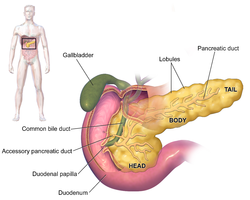Exocrine pancreatic insufficiency

Editor-In-Chief: Prab R Tumpati, MD
Obesity, Sleep & Internal medicine
Founder, WikiMD Wellnesspedia &
W8MD's medical weight loss NYC, sleep center NYC
Philadelphia medical weight loss and Philadelphia sleep clinics
| Exocrine pancreatic insufficiency | |
|---|---|

| |
| Synonyms | EPI |
| Pronounce | N/A |
| Specialty | N/A |
| Symptoms | Steatorrhea, weight loss, malnutrition, abdominal pain, bloating |
| Complications | Malabsorption, vitamin deficiency |
| Onset | Varies |
| Duration | Long-term |
| Types | N/A |
| Causes | Chronic pancreatitis, cystic fibrosis, pancreatic cancer, diabetes mellitus |
| Risks | Smoking, alcohol consumption, genetic disorders |
| Diagnosis | Fecal elastase test, 72-hour fecal fat test, serum trypsinogen |
| Differential diagnosis | Irritable bowel syndrome, celiac disease, Crohn's disease |
| Prevention | N/A |
| Treatment | Pancreatic enzyme replacement therapy, dietary modifications |
| Medication | Pancrelipase |
| Prognosis | N/A |
| Frequency | Common in cystic fibrosis patients, varies in general population |
| Deaths | N/A |
Exocrine Pancreatic Insufficiency (EPI) is a medical condition characterized by the pancreas's inability to produce and secrete sufficient digestive enzymes into the small intestine. This leads to symptoms of malabsorption syndrome, abdominal discomfort, and bloating. EPI can be caused by various factors including chronic pancreatitis, cystic fibrosis, and autoimmune disorders.
Introduction[edit]
EPI occurs when the exocrine function of the pancreas is impaired, leading to difficulties in digesting food properly due to a lack of digestive enzymes.
Causes[edit]

Common causes of EPI include:
- Chronic Pancreatitis: Long-standing inflammation of the pancreas.
- Cystic Fibrosis: A genetic disorder affecting the lungs and pancreas.
- Autoimmune Disorders: Conditions where the immune system attacks the pancreas.
Symptoms[edit]
Symptoms of EPI typically include:
- Diarrhea
- Weight loss despite a normal appetite
- Abdominal pain and bloating
- Fatty stools (steatorrhea)
Diagnosis[edit]
Diagnosis of EPI may involve:
- Blood tests for nutrient deficiencies
- Fecal tests to measure enzyme levels
- CT scans or MRI for structural assessment
Treatment[edit]
Treatment for EPI focuses on managing symptoms and may include:
- Pancreatic enzyme replacement therapy (PERT)
- Dietary modifications
- Vitamins and supplements
- Treating the underlying cause
Management and Prognosis[edit]
Effective management involves:
- Regular monitoring and adjustments in therapy
- Lifestyle changes to cope with dietary restrictions
- Psychological support for chronic illness management
Prevention[edit]
While EPI itself may not be preventable, managing risk factors can be crucial, such as:
- Avoiding alcohol and smoking
- Managing underlying conditions like diabetes
References[edit]
<references />
- Johnson, T. & Brown, A. (2022). Exocrine Pancreatic Insufficiency: A Comprehensive Review. Journal of Gastroenterology.
- Singh, V. K., & Anderson, M. A. (2023). Advances in Diagnosis and Treatment of Exocrine Pancreatic Insufficiency. Clinical Medicine Insights.
Ad. Transform your life with W8MD's Budget GLP-1 injections from $49.99


W8MD offers a medical weight loss program to lose weight in Philadelphia. Our physician-supervised medical weight loss provides:
- Weight loss injections in NYC (generic and brand names):
- Zepbound / Mounjaro, Wegovy / Ozempic, Saxenda
- Most insurances accepted or discounted self-pay rates. We will obtain insurance prior authorizations if needed.
- Generic GLP1 weight loss injections from $49.99 for the starting dose of Semaglutide and $65.00 for Tirzepatide.
- Also offer prescription weight loss medications including Phentermine, Qsymia, Diethylpropion, Contrave etc.
NYC weight loss doctor appointmentsNYC weight loss doctor appointments
Start your NYC weight loss journey today at our NYC medical weight loss and Philadelphia medical weight loss clinics.
- Call 718-946-5500 to lose weight in NYC or for medical weight loss in Philadelphia 215-676-2334.
- Tags:NYC medical weight loss, Philadelphia lose weight Zepbound NYC, Budget GLP1 weight loss injections, Wegovy Philadelphia, Wegovy NYC, Philadelphia medical weight loss, Brookly weight loss and Wegovy NYC
|
WikiMD's Wellness Encyclopedia |
| Let Food Be Thy Medicine Medicine Thy Food - Hippocrates |
Medical Disclaimer: WikiMD is not a substitute for professional medical advice. The information on WikiMD is provided as an information resource only, may be incorrect, outdated or misleading, and is not to be used or relied on for any diagnostic or treatment purposes. Please consult your health care provider before making any healthcare decisions or for guidance about a specific medical condition. WikiMD expressly disclaims responsibility, and shall have no liability, for any damages, loss, injury, or liability whatsoever suffered as a result of your reliance on the information contained in this site. By visiting this site you agree to the foregoing terms and conditions, which may from time to time be changed or supplemented by WikiMD. If you do not agree to the foregoing terms and conditions, you should not enter or use this site. See full disclaimer.
Credits:Most images are courtesy of Wikimedia commons, and templates, categories Wikipedia, licensed under CC BY SA or similar.
Translate this page: - East Asian
中文,
日本,
한국어,
South Asian
हिन्दी,
தமிழ்,
తెలుగు,
Urdu,
ಕನ್ನಡ,
Southeast Asian
Indonesian,
Vietnamese,
Thai,
မြန်မာဘာသာ,
বাংলা
European
español,
Deutsch,
français,
Greek,
português do Brasil,
polski,
română,
русский,
Nederlands,
norsk,
svenska,
suomi,
Italian
Middle Eastern & African
عربى,
Turkish,
Persian,
Hebrew,
Afrikaans,
isiZulu,
Kiswahili,
Other
Bulgarian,
Hungarian,
Czech,
Swedish,
മലയാളം,
मराठी,
ਪੰਜਾਬੀ,
ગુજરાતી,
Portuguese,
Ukrainian



